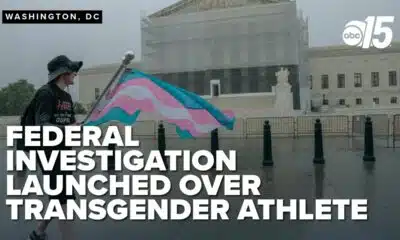News from the South - Louisiana News Feed
Doctors seek conscience protections to provide abortion care in new federal lawsuit • Louisiana Illuminator
Doctors seek conscience protections to provide abortion care in new federal lawsuit
by Sofia Resnick, Louisiana Illuminator
February 7, 2025
About three months into conceiving their second child last fall, the young South Carolina couple was given an earth-shattering prognosis. And two grim choices.
Based on multiple genetic tests and an ultrasound that indicated the baby was not growing normally, a maternal-fetal medicine specialist suspected triploidy, a deadly genetic disorder in which chromosomes are tripled rather than doubled. The couple could wait for their daughter to die in utero or within minutes or hours of being born. Or they could terminate.
But because of a nascent law in South Carolina — which bans pregnancy termination if cardiac activity is detectable on an ultrasound — the couple now had to prove their baby’s condition was fatal in order to qualify for an abortion under the state’s limited exceptions.
The mom, who asked to withhold her name to protect her family’s privacy, said cardiac activity was still audible but the pregnancy was so underdeveloped, the medical team could not extract a sample from the placenta. And when they began debating whether to pull down her uterus, the mom said she and her husband decided to leave the state. Their doctor connected them with a hospital in Virginia, where abortion is legal.
“I feel discouraged from ever trying to do this again,” said the mom, who told States Newsroom that she and her husband wanted the abortion so she could start grieving her lost child and ensure her own health. “I love being a mom. I want kids. I have a beautiful child. But if something like this ever happens to me again, it’s not going to be better, but it could be a lot worse in this new political climate.”
GET THE MORNING HEADLINES.
For some OB-GYNs in South Carolina, denying care to pregnant patients has become a devastating new part of their job. In a first-of-its-kind lawsuit with national implications, a group of OB-GYNs is asking a federal court to overturn the state’s abortion ban on the basis that it does not allow “physicians to provide abortion care mandated by their religious beliefs.”
“Most people go into medicine to provide care and feel very strongly about that, particularly in the field that they have expertise. But as human beings, we also have a conscience and religious beliefs that sustain and nurture what we do in our professional realm,” said Dr. Natalie Dawn Bingham, an OB-GYN who practices in Columbia and who serves as an elder at First Presbyterian Church in Spartanburg.
She is the lead plaintiff among five doctors who say the state abortion law’s exceptions violate the First Amendment’s due process clause for being too vague and violate the free exercise clause. Passed in 2023, the state’s so-called “fetal heartbeat” law effectively bans abortion around six weeks’ gestation, before many women first learn they are pregnant. (In a separate state lawsuit, Planned Parenthood argues the law should actually allow abortions through the ninth week.)
Like similar legislation enacted in Florida, Georgia and Iowa, South Carolina’s law has exceptions for fatal fetal illnesses and if the pregnant person is in danger of death or an “irreversible physical impairment.”
Bingham, who has been practicing in the state since 2005, said these exceptions are poorly defined and difficult to qualify for, sparking debates about whether a fetus destined to die within hours or days of birth still constitutes as having a fatal condition, or whether a maternal diagnosis of cancer or severe hypertension would qualify as a medical emergency. She said the state has turned what were previously medical questions into legal ones, the possible consequences of which include losing one’s medical license, a $10,000 fine, and two years in prison.
To comply with the law, doctors have to report abortions provided under the exceptions and maintain related records for seven years, and they have to provide detailed medical documentation that supports the diagnosis of a fatal fetal anomaly. According to the lawsuit, some of the hospitals where plaintiffs work require consensus from multiple physicians, and many worry their judgment could be later second-guessed by prosecutors or medical board members.
Louisiana, New York leaders spar after doctor indicted for out-of-state abortion pill prescription
“How can you say that you could access these exceptions based on reasonable medical judgment when you already are not respecting the medical judgment of the people making these decisions?” said Bingham, who like the other OB-GYN plaintiffs in the case works with high-risk patients. “Down the line, at any point in time, some arbitrary prosecutor could call that into question, who doesn’t have any medical training.”
In cases of rape or incest, abortion is legal up to 12 weeks’ gestation. The law requires that a doctor tell the patient that a police report must be filed within 24 hours of the abortion. “In a rare instance in which a rape survivor was willing to report the rape to law enforcement, the police insisted on coming to her home to complete the report,” the complaint reads. “The experience was so degrading that the patient permanently left South Carolina.”
The lawsuit also notes that the 12-week limit further precludes rape and incest survivors from accessing abortion under these exemptions because many survivors are children or teenagers and often don’t discover they are pregnant until later. From the law’s effective date in August 2023 through December 2023, fewer than five abortions were provided under the rape or incest exception, according to state health data.
Bingham said the only pediatric and adolescent OB-GYN moved to Virginia over legal issues.
An emerging legal strategy
During his recent confirmation hearing before the U.S. Senate Committee on Finance, Health and Human Services secretary nominee Robert F. Kennedy Jr. agreed when asked by U.S. Sen. James Lankford, R-Oklahoma, if he supported conscience protections for anti-abortion health professionals.
“Forcing somebody to participate in a medical procedure as a provider that they believe is murder does not make any sense to me,” Kennedy replied.
Despite implications to the contrary, there are several federal laws that allow providers to opt out of abortion, including the Weldon Amendment, named after Dave Weldon, President Donald Trump’s nominee to head the U.S. Centers for Disease Control and Prevention.
In recent years, anti-abortion groups have successfully used religious freedom laws as arguments against having to provide or refer for contraception. In 2014 the U.S. Supreme Court ruled in Burwell v. Hobby Lobby Stores, Inc., that the birth control coverage mandate in the Affordable Care Act violated the religious rights of for-profit corporate owners.
In 2020’s Little Sisters of the Poor Saints Peter and Paul Home v. Pennsylvania decision, the Supreme Court upheld the Trump administration’s regulations allowing employers with religious or moral objections to opt out of providing contraceptive coverage to employees.
Filed last month, Bingham v. Wilson is one of the first federal cases to look at doctors’ religious and conscience rights from an abortion-rights perspective.
At a conference of OB-GYNs about 18 months ago, Bingham said she and other physicians began discussing their legal options.
“If there is a right to refuse care, there certainly seems to be the corollary where we have a right to provide care, particularly based on our conscience, and then the tenets of each of our own religions, and based on years of training and dedication,” Bingham said, noting that South Carolina has a conscience law that allows health providers to refuse care.
Her co-plaintiffs include complex family planning specialist and Incarnation Lutheran Church member Dr. Patricia Seal, complex family planning specialist Dr. Jessica Tarleton of Christian and Jewish faith, OB-GYN Dr. Katee Wyant, and an anonymous complex family planning specialist known as Jane Doe. They are represented by the Lawyering Project and the Law Office of Bill Nettles.
“For these five physicians it’s almost every day that they are setting aside their most cherished beliefs,” said Rupali Sharma, founder of and senior counsel at the Lawyering Project. “Their faith commands them to place others before themselves, and so when they don’t provide abortion care to someone who could now suffer long-term debilitating physical or mental health consequences, they feel like they’re putting their license, their families, their freedom from imprisonment above that patient, and that too was something that these physicians just cannot abide by.”
In the lawsuit, plaintiffs ask for the law to be overturned or at least clarified to require law enforcement to defer to a woman’s doctor in the cases excepted under the law. They argue the law discriminates by allowing for some secular exceptions but not religious ones.
New Orleans launches tool to help doctors find reproductive care drug amid tight state restrictions
“South Carolina’s Abortion Ban is neither religiously neutral nor generally applicable,” the complaint reads. “It allows people to terminate potential life for a wide variety of secular purposes. These allowances undermine South Carolina’s purported interest in criminalizing the termination of potential life as much as abortion care compelled by Plaintiffs’ deeply held beliefs would.”
Sharma said that before the 2022 Dobbs decision, the Lawyering Project argued that an Indiana restriction requiring abortion clinics to bury or cremate the remains from all abortions and miscarriages violated the free exercise clause. They successfully blocked the law until 2023, when the injunction was suspended.
Since then, religious progressives have challenged abortion bans in Florida, Indiana, and Kentucky using arguments that their faith compels them to obtain abortions in certain circumstances. The lawsuits in Florida and Kentucky were dismissed for lack of standing while litigation continues in Indiana.
Abortion-law expert Mary Ziegler said that unlike these state lawsuits, the South Carolina doctors might have a better claim of standing because they can cite direct harm, as they’re prohibited from providing care their religion would mandate. But she said that while legal scholarship has grown around the secular versus religious exceptions argument, the legal theory has rarely been tested in court. The University of California Davis law professor noted that in the 2014 Hobby Lobby decision plaintiffs were granted relief even though they weren’t directly administering care.
“It wasn’t like the employer in Hobby Lobby was giving people birth control. There were lots of other steps along the way, whereas in this case the physicians are arguing that they are … not intervening when they feel religiously obligated to,” Ziegler said.
In some of these abortion-rights religious freedom cases, the challenged states have cast doubt on plaintiffs’ sincere religious beliefs.
Sharma says to doubt the religious and conscientious beliefs of her clients is not to understand their jobs.
“It’s about when you see suffering and you’re empowered to stop it, you stop it, right?” Sharma said. “And the idea that these things wouldn’t be central to most faiths, is kind of astounding to me. Of course, abortion and religion are interlinked, because abortion for many people and religion for many people is about you mattering and your life mattering and your family mattering, and being able to preserve those things and protect those things.”
YOU MAKE OUR WORK POSSIBLE.
Louisiana Illuminator is part of States Newsroom, a nonprofit news network supported by grants and a coalition of donors as a 501c(3) public charity. Louisiana Illuminator maintains editorial independence. Contact Editor Greg LaRose for questions: info@lailluminator.com.
News from the South - Louisiana News Feed
The art collective is dead, long live the art collective
SUMMARY: At the Blue Moon Saloon, musicians like Craig Guillory collaborate in weekly Cajun jams, inspiring each other’s art. For non-musical artists seeking community, ARCHIVES, co-founded by Emma Sonnier and Lex Thomas, fosters collaboration, exhibitions, and professional growth for emerging artists in Lafayette. The group addresses isolation post-education and economic barriers like costly supplies and studio spaces. ARCHIVES hosts events including figure drawing classes and artists’ lounges, offers micro-grants to cover exhibition fees, and plans a supply library. Their efforts build vital networks, supporting artists financially and socially, helping them sustain and advance their creative practices beyond formal settings.
The post The art collective is dead, long live the art collective appeared first on thecurrentla.com
News from the South - Louisiana News Feed
Heat continues for New Orleans, storms possible Wednesday
SUMMARY: Heat continues across New Orleans with highs in the low to mid-90s, feeling over 100 degrees in some rain-free areas. Showers and thunderstorms are currently affecting parts of Southeast Louisiana, especially western metro areas and offshore near Plaquemines Parish, bringing heavy rain, lightning, and gusty winds up to 50 mph. This unsettled weather pattern will persist through the Fourth of July holiday. An upper-level ridge is keeping temperatures above average and suppressing widespread storms until Saturday. Next week, the ridge will break down, increasing rain chances to about 40%, with scattered storms expected and a possible tropical development off the southeast coast.
Heat and storms possible
Subscribe to WDSU on YouTube now for more: http://bit.ly/1n00vnY
Get more New Orleans news: http://www.wdsu.com
Like us: http://www.facebook.com/wdsutv
Follow us: http://twitter.com/wdsu
Instagram: https://www.instagram.com/wdsu6/
News from the South - Louisiana News Feed
Sean 'Diddy' Combs acquitted of most serious charges, convicted of prostitution-related offenses
SUMMARY: Sean “Diddy” Combs was convicted on prostitution-related charges but acquitted of sex trafficking and racketeering in a federal trial that could still mean up to 10 years in prison. The 55-year-old hip-hop mogul faced allegations of coercing girlfriends and paid male sex workers into drug-fueled sexual encounters. Combs’ defense argued the women were willing participants. The trial included testimony from ex-girlfriends, notably singer Cassie, who described abuse and manipulation. Kid Cudi also testified, alleging Combs was involved in a firebombing of his car. While Combs was acquitted of the most severe charges, the verdict likely ends his multifaceted entertainment career.
The post Sean 'Diddy' Combs acquitted of most serious charges, convicted of prostitution-related offenses appeared first on wgno.com
-
Mississippi Today6 days ago
Defendant in auditor’s ‘second largest’ embezzlement case in history goes free
-
News from the South - Georgia News Feed5 days ago
Are you addicted to ‘fridge cigarettes’? Here’s what the Gen Z term means
-
The Conversation6 days ago
Toxic algae blooms are lasting longer than before in Lake Erie − why that’s a worry for people and pets
-
News from the South - Tennessee News Feed6 days ago
5 teen boys caught on video using two stolen cars during crash-and-grab at Memphis gas station
-
News from the South - Kentucky News Feed7 days ago
Error that caused Medicaid denials has been corrected, says cabinet in response to auditor letter
-
News from the South - Georgia News Feed7 days ago
GOP mega-bill stuck in US Senate as disputes grow over hospitals and more
-
News from the South - South Carolina News Feed5 days ago
Federal investigation launched into Minnesota after transgender athlete leads team to championship
-
Local News6 days ago
St. Martin trio becomes the first females in Mississippi to sign Flag Football Scholarships










































